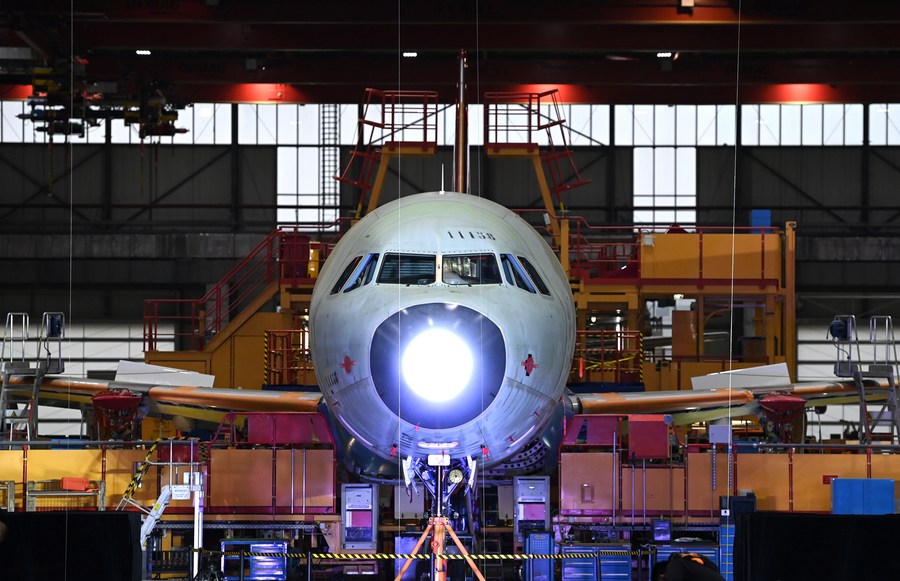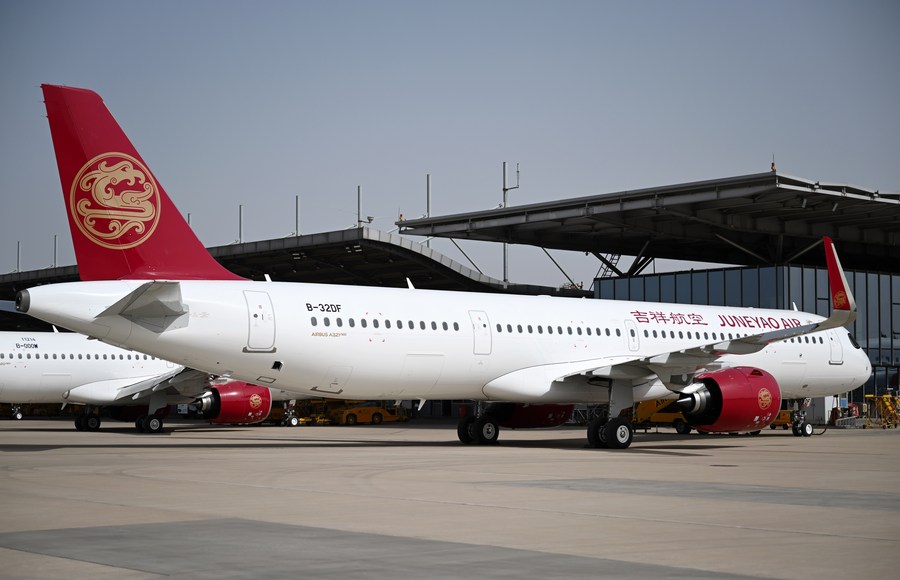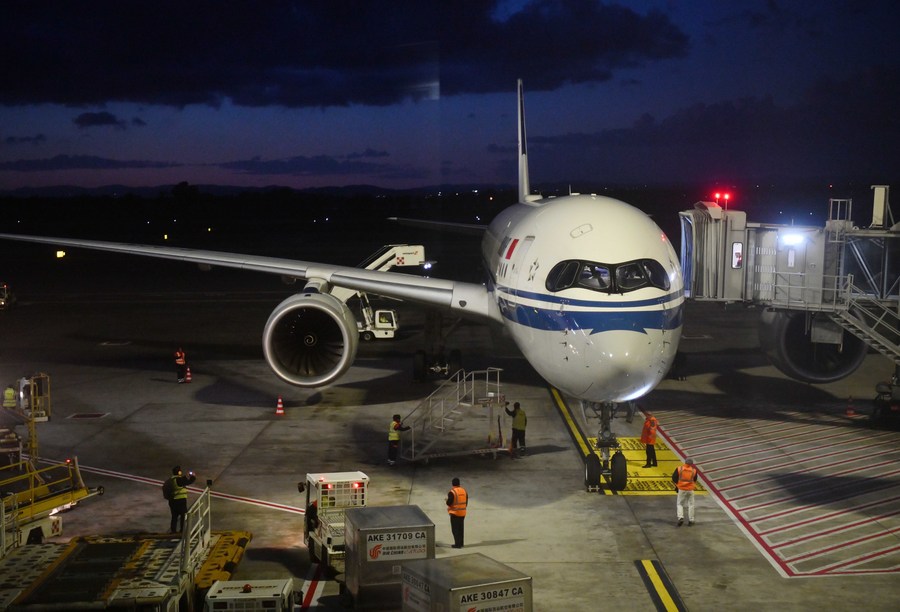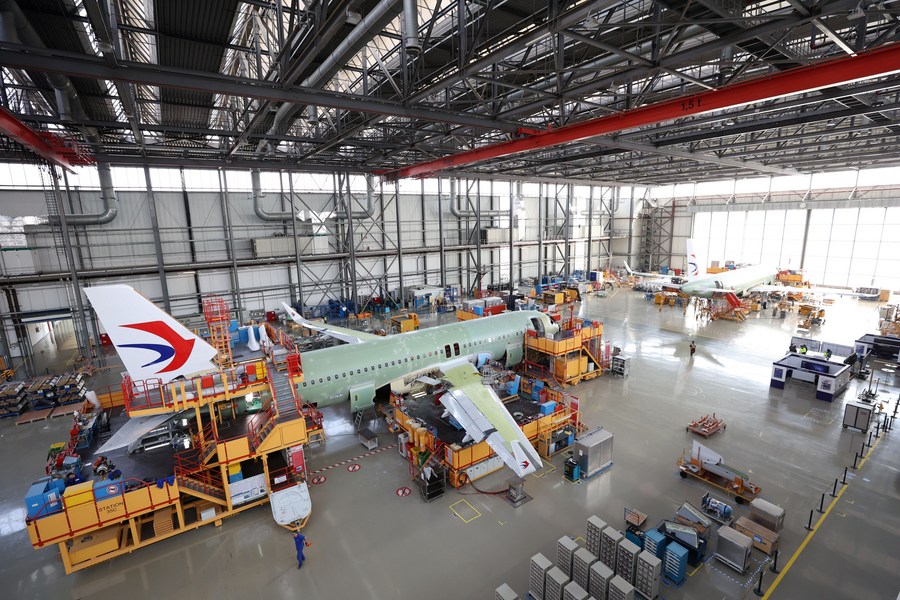China very important strategic partner: Airbus CEO

The first Airbus A321 aircraft is produced at the Final Assembly Line Asia (FALA) facility in north China's Tianjin on Nov. 9, 2022. (Xinhua/Zhao Zishuo)
China is a very important strategic partner to Airbus, and its supply chain is an integral part of the world's aviation industry, Airbus CEO Guillaume Faury said.
PARIS, April 18 (Xinhua) -- "If you put aside the pandemic times, aviation in China has been growing at a pace that is faster than in the rest of the world," Guillaume Faury, chief executive officer of European aircraft manufacturer Airbus, said in a recent interview with Xinhua.
China, he said, is a very important strategic partner to Airbus, and its supply chain is an integral part of the world's aviation industry, which has shown great industrial resilience and competitiveness over the past three years.
"What always strikes me in China is the energy, the speed, the optimism and the ability to go fast," he added.
Airbus is currently planning to build a second Final Assembly Line (FAL) to expand the production capacity of the A320 family of passenger aircraft.

This photo taken on March 24, 2023 shows the first China-assembled A321neo aircraft in north China's Tianjin.(Xinhua/Zhao Zishuo)
"This decision is directly linked to our plan to increase global production of our successful A320 family of passenger aircraft," Faury said. By 2026, Airbus intended to build 75 of these aircraft per month to meet the strong demand of global customers.
The Final Assembly Line Asia in Tianjin, northern China, started operation in 2008. It has already produced over 600 aircraft, representing about 30 percent of China's Airbus A320 fleet.
"In order to support this production ramp-up, we have decided to open a second FAL in Tianjin, relying on the Chinese setup and local ecosystem, which has proved to be successful over the last decade," Faury said.
With the new FAL, which is set to become operational in 2025, Airbus is expecting to double its production capacity in Tianjin and deliver more aircraft to its customers in China and Asia, while supporting the global production increase.
According to Faury, China represents about 20 percent of the world's commercial aviation market. He predicted that over the next 20 years, air traffic in China would grow by about 5.3 percent every year, significantly faster than the world average of 3.6 percent, leading to a demand for more than 8,000 passenger and freighter aircraft between now and 2040.

The first resumed direct flight from Beijing to Rome arrives at the Fiumicino airport in Rome, Italy, March 27, 2023. (Xinhua/Jin Mamengni)
"I believe Airbus is well-placed to capture that demand," he said, highlighting Airbus' single-aisle A320, and the wide-body aircraft A330neo and A350 for long-haul flights to connect China with the rest of the world.
Turning to freighter aircraft, Faury noted that the demand for cargo has been boosted by e-commerce and global trade growth, and this will definitely translate into a strong increase of the fleet of freighter aircraft operated in China.
During their most recent visit to China, Airbus executives signed a new agreement with the China National Aviation Fuel Group Corporation (CNAF) on intensifying cooperation in the production and development of common standards for SAFs (sustainable aviation fuel).
Faury said he believes that this will develop the SAF supply chain by boosting local production of SAF towards the ambition of using 10 percent SAF by 2030.

Staff members work at Airbus' Tianjin final assembly line for the A320-family of jets in north China's Tianjin, Feb. 24, 2022. (Airbus China/Handout via Xinhua)
"We are also looking at other levers that will help us decarbonize aviation, and one of them is the development of hydrogen-powered planes." Faury said that Airbus aims to bring to service the first hydrogen-powered commercial aircraft by 2035.
He told Xinhua that a new research center was inaugurated in Suzhou in east China's Jiangsu Province, which will focus on research related to the future hydrogen infrastructure for aviation, as well as advanced manufacturing, electrification and future cabins.
"Airbus is committed to supporting our sector's ambition to reach net-zero CO2 emissions by 2050," he said, adding that as a proponent of multilateralism and free trade, Airbus is an advocate of win-win cooperation.
- Airbus to celebrate 40 years of success in China's skies
- Airbus opens its first safety promotion center in China
- Airbus showcases new aircraft at Airshow China, highlighting sustainability
- Economic Watch: Airbus projects strong demand for aircraft in China over next 20 years
- Airbus shows strong commitment to continuous development in China


